Overview
Mortgages in the UK for non-residents are specifically tailored for individuals residing outside the country, enabling them to purchase property despite facing unique eligibility criteria and higher deposit requirements.
Securing these mortgages can be complex, often due to factors such as elevated interest rates and a limited pool of lenders.
However, understanding the market and preparing adequate documentation can significantly enhance your chances of approval. This knowledge not only empowers you but also positions you strategically within the property market.
Introduction
Navigating the complexities of the UK mortgage market poses significant challenges for non-residents, who frequently encounter unique hurdles when seeking to invest in property. This article explores the specific mortgage options available for expatriates and foreign investors, illuminating:
- Eligibility requirements
- Types of mortgages
- Common challenges faced during the application process
As the UK property market continues to attract international interest, understanding these dynamics becomes essential for non-residents aiming to make informed decisions. Furthermore, as trends evolve and new statistics emerge, potential buyers are urged to stay informed about the shifting landscape of mortgage lending, ensuring they are well-equipped to secure their financial future in the UK.
Understanding Mortgages for Non-Residents in the UK
Mortgages in the UK for non-residents are tailored for individuals residing outside the UK who wish to purchase property. This demographic includes expatriates, foreign investors, and those with personal or business ties to the UK. Unlike UK residents, non-residents often face unique eligibility criteria and lending conditions, making it essential to understand the available mortgage options.
As we look towards 2025, the UK real estate market continues to attract international interest, bolstered by its reputation for stability and potential for capital appreciation. Recent trends suggest a rising interest among non-residents, with forecasts indicating that the proportion of non-residents purchasing property could increase significantly. Indeed, the current landscape reveals a surge in loan applications from expatriates, reflecting a market recovery despite challenges such as rising interest rates and the ongoing cost of living crisis.
For expatriates and foreign investors, comprehending financing options, such as mortgages in the UK for non-residents, is crucial. Non-residents generally have access to a variety of loan products, including fixed-rate and variable-rate mortgages, although they may encounter higher deposit requirements and interest rates compared to their resident counterparts. Experts assert that while securing mortgages in the UK for non-residents can be more complex, it is certainly achievable with the right guidance and support.
Statistics indicate that the amount owed by UK homeowners in loan arrears hit a low of £8.7 billion in Q1 2024, signaling a healthier market environment. This positive trend is further supported by projections that the rate of loans exceeding 90% loan-to-value (LTV) could rise to approximately 7.2% by Q3 2025, suggesting a shift in lending practices that may benefit individuals not residing locally. Additionally, survey data from Just Group reveals that the typical age to settle a home loan in the UK is currently 65, which could impact individuals abroad considering long-term investments in UK real estate.
Successful loan applications for expatriates often hinge on demonstrating financial stability and a thorough understanding of the UK property market. Case studies illustrate that many foreign applicants have successfully navigated the loan process, utilizing specialized brokerage services to secure favorable terms. The case study titled 'Current Mortgage Market Challenges' underscores the complexities faced by individuals living abroad when seeking home loans, particularly due to rising loan rates and the cost of living crisis.
As the industry evolves, staying informed about current trends and expert insights will be vital for non-residents looking to invest in mortgages in the UK. Readers are encouraged to remain updated on market changes, particularly with the upcoming edition of the lending statistics scheduled for publication on 10 June 2025.
Eligibility Requirements for Non-UK Residents
To qualify for a loan as a non-UK resident, applicants must navigate several essential criteria that lenders typically enforce:
- Proof of Income: Lenders require robust evidence of a stable income. Acceptable documentation may include payslips, tax returns, or bank statements, demonstrating consistent earnings.
- Credit History: A solid credit score is crucial. Non-residents may need to furnish credit reports from their home country, which can be a determining factor in the approval process.
- Deposit: Non-residents are generally expected to provide a larger deposit, often ranging from 25% to 40% of the property's value. This higher requirement reflects the perceived risk associated with lending to non-residents, especially regarding mortgages in the UK for non-residents.
Understanding these requirements is vital for non-residents aiming to prepare their applications effectively. Recent trends indicate that by Q3 2025, approximately 7.2% of all UK home loans may have a loan-to-value (LTV) ratio of 90% or higher, highlighting the evolving landscape of lending. The loan lending environment is governed by the FCA and Prudential Regulatory Authority, which supervise loan providers and administrators, ensuring compliance and clarity in the sector.
In light of the current housing market challenges, including rising rates and a cost of living crisis, approvals are beginning to rise again, suggesting a potential recovery. However, borrowers must remain vigilant about their financial situations. For instance, case studies reveal that applicants who meticulously prepare their documentation and understand lender expectations often experience more favorable outcomes. Expert guidance highlights the significance of being well-informed about eligibility criteria, as this knowledge can greatly improve the likelihood of obtaining a loan.
As the market continues to evolve, keeping up with these requirements will enable individuals from abroad to effectively manage the intricacies of securing mortgages in the UK for non-residents. Furthermore, based on survey information from Just Group, the typical age to settle a home loan in the UK is now 65, which may impact foreign individuals' long-term financial strategies.
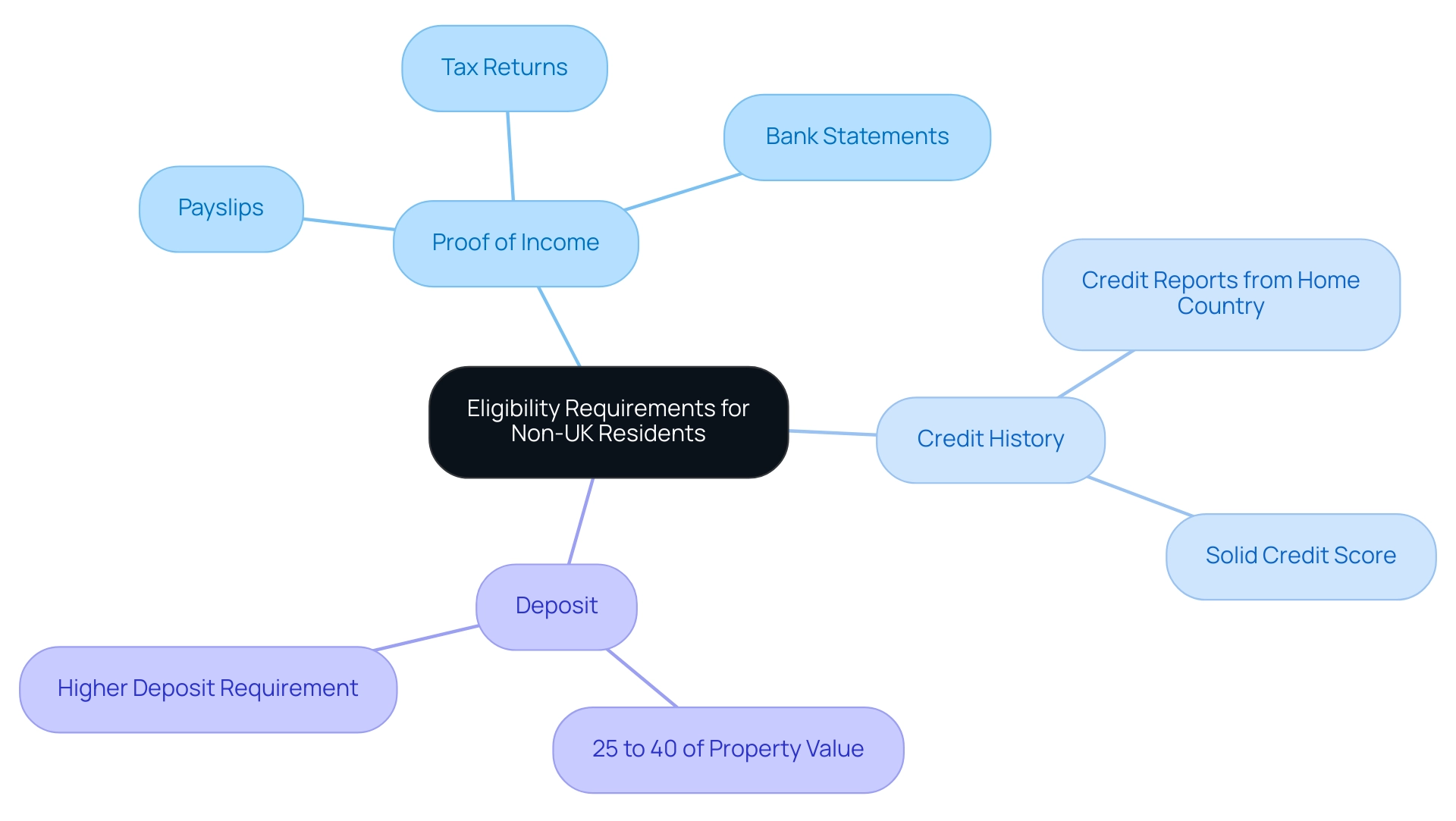
Types of Mortgages Available for Non-Residents
Non-residents have access to a variety of financing options in the UK, each designed to meet different needs and investment strategies:
- Buy-to-Let Financing: Particularly appealing for investors aiming to acquire rental properties, these options typically come with specific criteria regarding expected rental income. This ensures that the investment remains financially viable. As of 2025, the increasing popularity of mortgages in the UK for non-residents reflects a growing market share as international investors seek opportunities in the UK property market.
- Residential Loans: For non-residents looking to purchase a home for personal use, residential loans are available. However, mortgages in the UK for non-residents often entail stricter lending criteria, including proof of income and creditworthiness, which can vary significantly based on the applicant's country of residence.
- Commercial Loans: Non-residents interested in acquiring commercial properties can opt for commercial loans. These loans typically require a thorough business plan and detailed economic projections, enabling lenders to evaluate the viability of the investment. At Finance Story, we specialize in creating polished and highly individualized business cases to present to banks, ensuring that your proposal meets the heightened expectations of lenders. We collaborate with a complete variety of lenders, including high street banks and creative private lending panels, to offer customized financing solutions for different commercial properties such as warehouses, retail locations, factories, and hospitality projects.
- Expat Loans: Specifically designed for expatriates, these loans consider income earned overseas, often providing more flexible terms compared to conventional loan products. This adaptability is vital for individuals not residing in the area who might have intricate financial circumstances, particularly when exploring mortgages in the UK for non-residents. Understanding mortgages in the UK for non-residents is crucial for such individuals to make informed choices suited to their investment or living requirements. As the UK housing loan market evolves, statistics indicate that by Q3 2025, approximately 7.2% of all UK loans may have a loan-to-value (LTV) ratio of 90% or higher, reflecting a 2.2% increase from Q3 2022. This highlights the increasing accessibility of financing options. Furthermore, with the total UK loan debt reaching around £1.6 trillion by March 2024, the landscape for mortgages in the UK for non-residents is becoming increasingly competitive and diverse.
Case studies reveal that more than 9,500 loan-related grievances were registered with the Financial Ombudsman between 2022 and 2023, underscoring the importance of thorough research and understanding of mortgages in the UK for non-residents. As noted by Just Group, a further third (32%) of borrowers had to extend their loan to fund home improvements, with around one in four (23%) claiming it was in direct response to current interest rates. By exploring these options and utilizing the expertise of Finance Story, including refinancing opportunities to meet the evolving needs of your business, potential buyers can navigate the complexities of the UK lending market effectively.
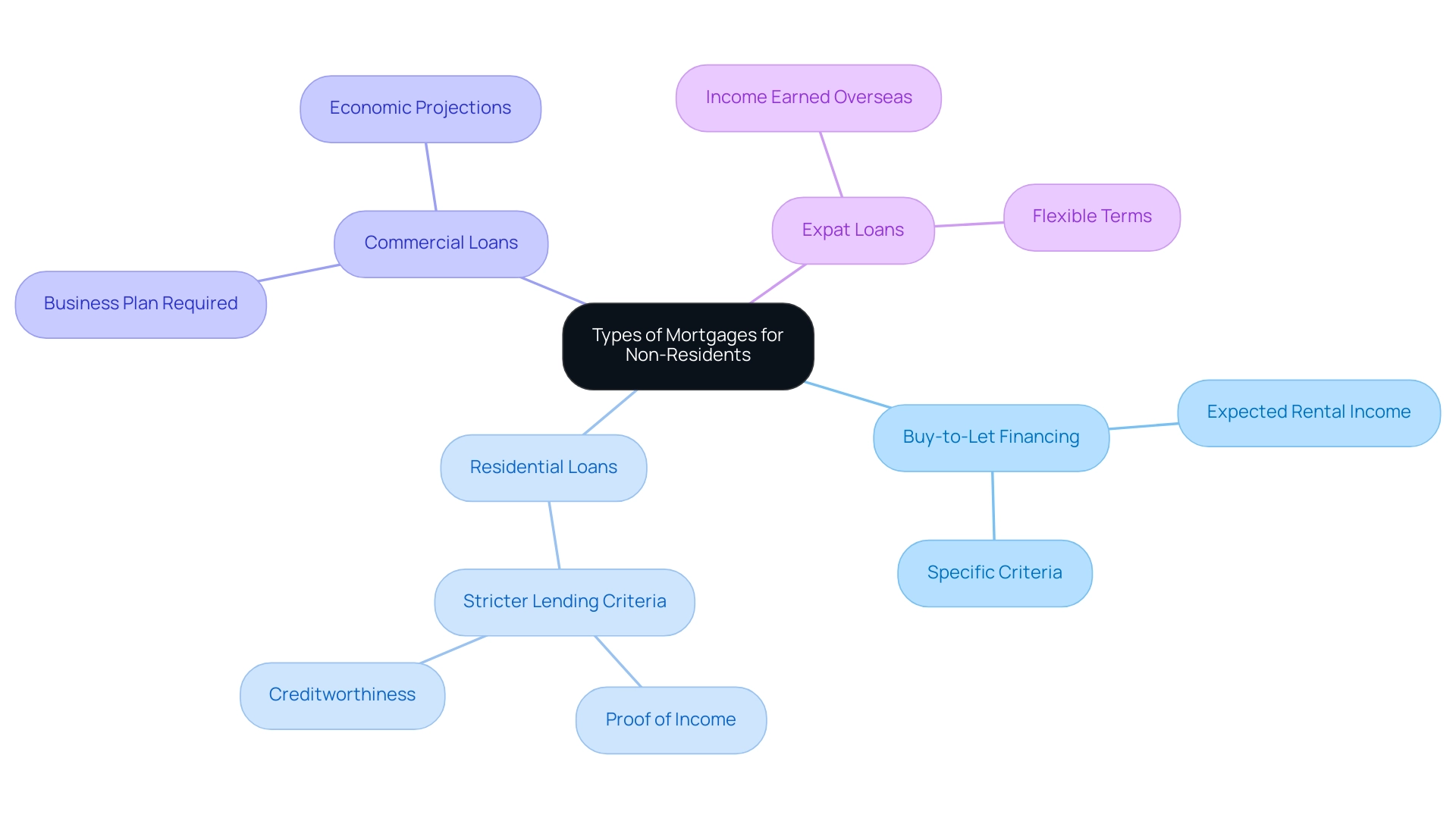
Common Challenges in Securing Mortgages as a Non-Resident
Non-residents often encounter a myriad of challenges when seeking mortgages in the UK, which can significantly complicate the borrowing process. Key obstacles include:
- Higher Interest Rates: Due to the perceived risks associated with non-resident borrowers, lenders frequently impose higher interest rates. This trend has been particularly pronounced in 2025, as the average interest rate for mortgages in the UK for non-residents can be notably higher than that for residents, reflecting the increased risk profile.
- Limited Lender Options: The market for mortgages in the UK for non-residents is not as expansive as that for residents. Many lenders do not provide mortgages in the UK for non-residents, which can severely limit options and potentially lead to higher costs for those seeking financing.
- Complex Documentation Requirements: When applying for mortgages in the UK for non-residents, extensive documentation is often required, which may include proof of income from abroad, foreign credit histories, and additional monetary statements. This complexity can lead to delays and confusion during the application process for mortgages in the UK for non-residents.
Currency fluctuations can impact the availability of mortgages in the UK for non-residents, posing another significant challenge. Non-residents earning income in a foreign currency may find that fluctuations in exchange rates can affect their loan repayments, especially when dealing with mortgages in the UK for non-residents, complicating their financial planning and budgeting.
In the context of the lending environment, it is significant that there has been a decline of approximately 3% from a peak of nearly £9 billion at the beginning of 2021, suggesting a constricting situation that may further hinder access for individuals not residing in the country.
Grasping these challenges is vital for non-residents aiming to effectively navigate mortgages in the UK for non-residents. As Tim Parkes, chief executive of RAW Capital Partners, states, "For the market to keep pace with the changing nature of the global investment landscape, brokers and lenders must collaborate to broaden their offerings and develop financial products that accommodate a wider range of borrowers." By being aware of these potential hurdles, borrowers can prepare adequately and seek appropriate advice to enhance their chances of securing favorable loan terms.
For instance, collaborating with experienced loan brokers who specialize in mortgages in the UK for non-residents can provide valuable insights and access to a broader range of products tailored to their unique circumstances. Additionally, the high number of loan-related grievances—over 9,500 registered with the Financial Ombudsman between 2022-23—illustrates ongoing issues within the lending sector that affect borrower satisfaction, further emphasizing the importance of informed decision-making in this complex landscape.
Tips for Improving Your Mortgage Application Success
To enhance the likelihood of securing a mortgage as a non-resident, consider these effective strategies:
- Build a UK Credit History: Establishing a UK credit history is crucial. Opening a UK bank account and using it regularly can significantly contribute to this process. Consistent transactions and prompt payments can foster a favorable credit profile, which lenders will evaluate during the loan application.
- Prepare Comprehensive Documentation: A well-organized application can streamline the approval process. Gather essential documents such as proof of income, tax returns, and bank statements. This thorough preparation not only accelerates the application but also demonstrates your monetary reliability to lenders.
Engaging with a mortgage broker who specializes in mortgages in the UK for non-residents can be invaluable. These experts have access to a wider array of lenders and can offer customized guidance that aligns with your unique economic situation, thereby increasing your chances of approval.
- Demonstrate Financial Stability: Lenders seek assurance that borrowers can meet repayment obligations. Presenting evidence of a strong financial position, including savings and investments, can bolster your application. This stability reassures lenders of your ability to manage loan repayments effectively.
Implementing these strategies can significantly enhance your chances of a successful loan application. As the landscape evolves, particularly with forecasts indicating that by Q3 2025, approximately 7.2% of all UK loans may have a loan-to-value (LTV) ratio of 90% or higher, it is essential to be proactive in your approach. This statistic underscores the increasing challenges individuals from outside may face in securing financing, particularly regarding mortgages in the UK for non-residents and saving for deposits.
Additionally, a recent report from Just Group noted that a further third (32%) of borrowers had to extend their loans to fund home improvements, with around one in four (23%) citing current interest rates as a direct influence. Comprehending these dynamics can assist outsiders in maneuvering through the intricacies of the UK lending market more effectively. Furthermore, with the average loan debt in the UK being approximately £150,719 and households paying an average of £5,290 in interest related to loans annually, demonstrating financial stability becomes even more critical.
The case study titled "Forecast for High LTV Loans" illustrates the potential rise in the percentage of loans with an LTV above 90%, suggesting that individuals from abroad must be well-prepared to face these challenges.
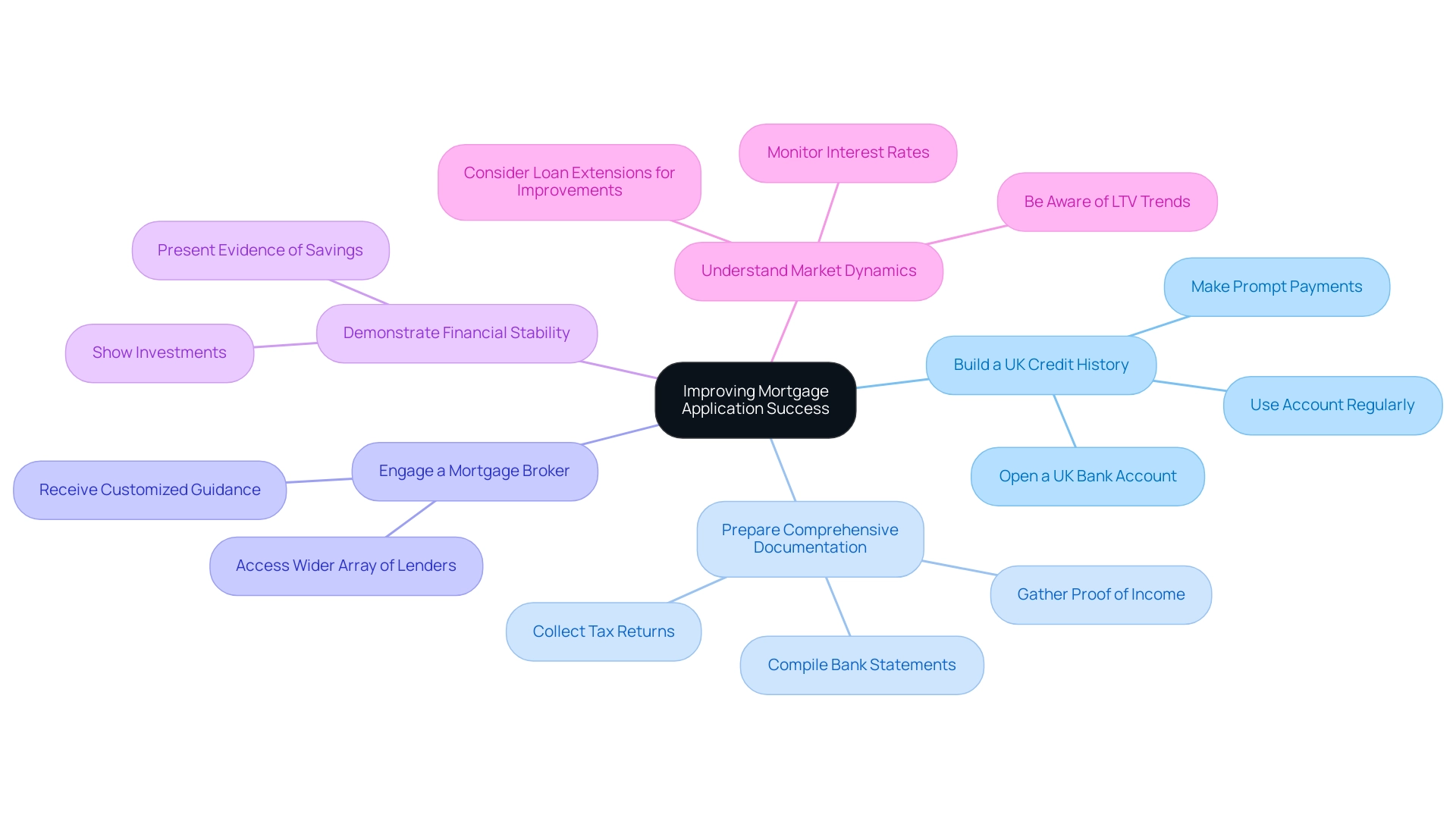
Key Lenders Offering Mortgages to Non-Residents
In the UK, several notable lenders offer mortgages for non-residents living abroad who are seeking financing alternatives. Among these, HSBC stands out with its diverse range of mortgage options. They provide competitive rates and flexible terms, making them a popular choice for international buyers.
NatWest also plays a crucial role in this sector by offering mortgages for non-residents, including both buy-to-let and residential loans. Their emphasis on thorough income verification and creditworthiness ensures that applicants are assessed fairly, which is essential for securing financing.
Skipton International specializes in providing mortgages tailored to the unique circumstances of overseas buyers. Their expertise in this niche market enables them to offer customized options that align with the financial goals of individuals living abroad. Furthermore, Clifton Private Finance acts as an intermediary, connecting individuals from abroad with lenders willing to consider their applications, thereby expanding the variety of available choices.
As of November 2024, total lending in the UK rose to £20.7 billion from £20.3 billion, indicating a growing interest in loan products, including those for individuals from abroad. This trend underscores the importance of exploring different lenders to identify appropriate financing alternatives tailored to personal requirements. Successful case studies illustrate how clients have navigated the complexities of securing mortgages for non-residents, particularly with HSBC, which has built a reputation for facilitating smooth application processes and providing exceptional support throughout.
At Finance Story, we recognize that navigating the mortgage landscape can be daunting, especially for non-residents. Our customized support ensures that you have access to the best products available, making the process as seamless as possible. We leverage our expertise to offer tailored financial solutions for both commercial and residential clients, ensuring that your unique needs are met. Understanding the offerings of these key lenders is vital for individuals from abroad seeking mortgages who wish to invest in property.
The upcoming edition of lending statistics, set for release on 10 June 2025, will provide further insights into the evolving landscape of non-resident loans in the UK. Additionally, recent decisions made by the Bank of England may influence the housing finance environment, making it crucial for individuals not residing in the country to stay informed about current market conditions.
Currency Considerations for Non-Resident Mortgage Payments
Non-residents navigating the UK loan landscape must carefully consider several currency-related factors that can significantly influence their monetary commitments.
Exchange Rate Fluctuations: Variations in exchange rates can lead to increased costs for loan repayments, particularly if the borrower's income is denominated in a different currency. For instance, a strengthening of the pound against the euro or dollar can inflate the repayment amounts for individuals living abroad. Thus, it is crucial to monitor these fluctuations closely.
Currency Conversion Fees: Individuals living abroad often face currency conversion fees when transferring funds internationally for loan payments. These fees can vary widely among lending institutions, potentially adding a substantial amount to the overall cost of mortgages in the UK for non-residents. In 2025, average conversion fees are projected to be around 2-3% of the transaction amount, underscoring the importance of selecting a cost-effective transfer method.
Hedging Strategies: To mitigate the risks associated with currency fluctuations, non-residents may consider employing hedging strategies. These monetary instruments can help secure exchange rates for future payments, providing greater predictability in budgeting. Collaborating with advisers who focus on international loans can provide customized hedging options that correspond with personal economic circumstances.
Impact of Currency Fluctuations on Loan Repayments: The instability of exchange rates can result in erratic variations in loan repayment amounts. For example, if a non-resident's income decreases in value relative to the pound, their loan payments could become disproportionately burdensome. Staying updated on market trends and potential economic shifts is crucial for making strategic decisions regarding home purchases and ongoing monetary commitments, particularly when it comes to mortgages in the UK for non-residents. Significantly, the household saving rate is anticipated to increase from just below 5.25% in 2023 to more than 7.75% in early 2025, signifying a transforming economic landscape.
Expert Insights on Managing Currency Risks: Specialists suggest that those living outside the country routinely assess their loan agreements and payment strategies to adjust to shifting currency circumstances. This proactive strategy can help reduce risks and ensure that financial obligations remain manageable. The Bank of England's declaration on 9 May 2024, indicating that the base rate would remain at 5.25% for the sixth consecutive occasion, further highlights the existing economic situation influencing loan rates and choices for individuals living abroad.
By being attentive to these currency factors, individuals living abroad can manage their loan repayments more efficiently, especially when dealing with mortgages in the UK for non-residents. This ultimately results in a more stable economic experience in the UK property sector. Additionally, recent financial year-to-date comparisons of UK residential transactions show provisional estimates for the 2024 to 2025 financial year at 955,190 non-seasonally adjusted transactions, highlighting the importance of staying informed about market dynamics.
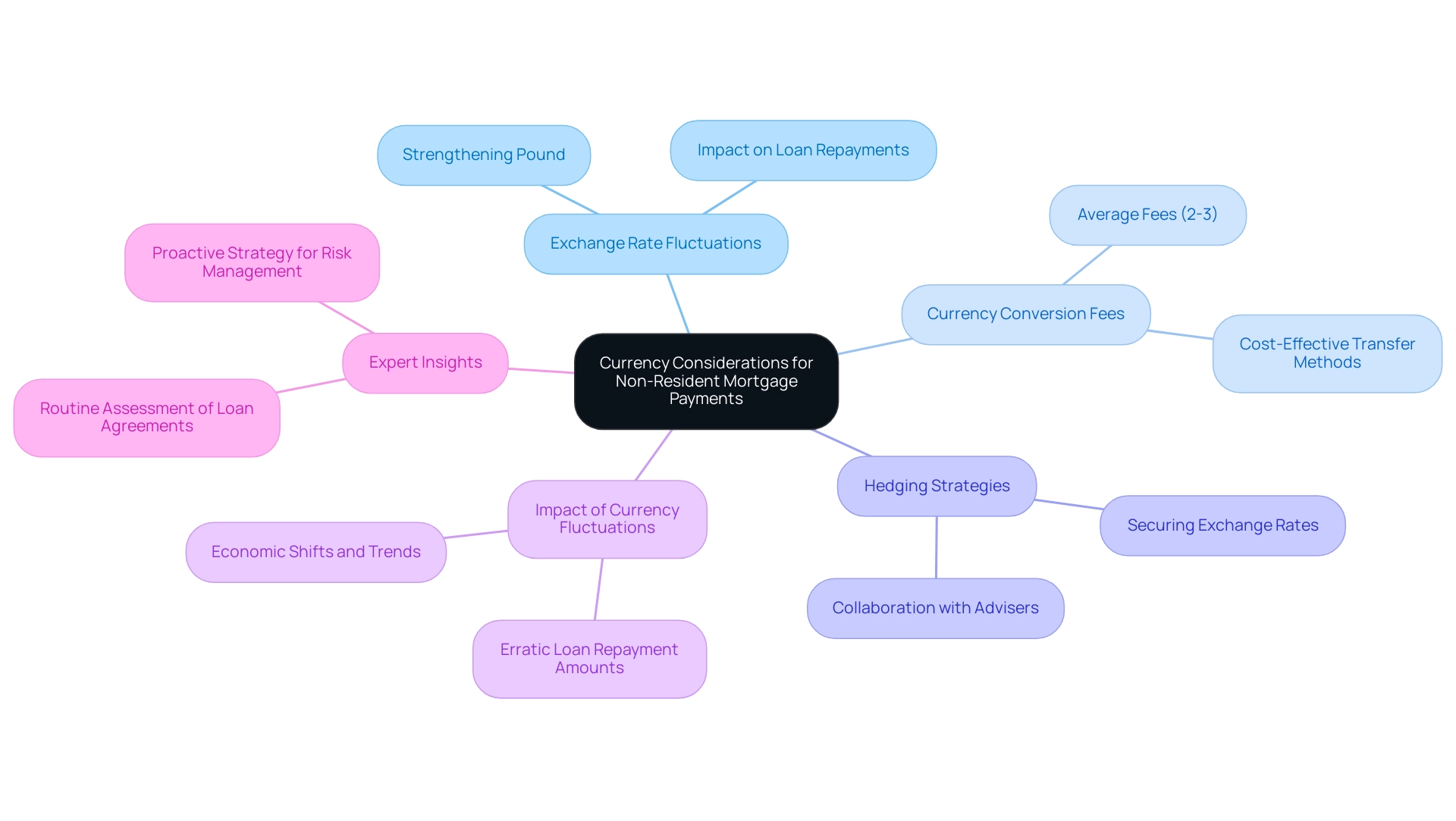
FAQs: Mortgages for Non-Residents in the UK
Commonly posed inquiries regarding mortgages in the UK for non-residents often arise as individuals explore their financing options. Here are some essential questions:
- Can individuals who do not reside obtain a loan in the UK? Yes, individuals who do not reside can secure loans, provided they meet specific eligibility criteria set by lenders. This includes demonstrating a stable income and a good credit history, even if it is based outside the UK.
- What is the minimum deposit required? Most lenders typically require a deposit ranging from 25% to 40% for non-resident loans. This higher deposit reflects the increased risk associated with lending to individuals from abroad.
- Are interest rates higher for individuals from abroad? Generally, yes. Non-residents may encounter higher interest rates compared to residents, as lenders perceive additional risks in financing properties for individuals living abroad.
- Do I need a UK bank account? While not always a strict requirement, having a UK bank account can significantly streamline the loan application process. It facilitates simpler oversight of payments and transactions associated with the home loan.
These FAQs provide crucial information for individuals outside the country contemplating mortgages in the UK, especially given the significant expansion in the home lending sector, which saw outstanding residential home loans reach £1,678.2 billion in early 2025. This growth indicates a positive outlook for non-residents considering mortgages in the UK. Furthermore, the housing loan market demonstrated greater resilience than previously anticipated in 2024, as noted by James Tatch, Head of Analytics at UK Finance, reassuring potential borrowers about the stability of financing options available to them.
However, it is vital to be aware of the risks, as the number of UK loans with arrears of over 2.5% of the outstanding balance stood at 110,150 in Q1 2024. Understanding these aspects can empower potential borrowers to navigate the complexities of securing a mortgage effectively.
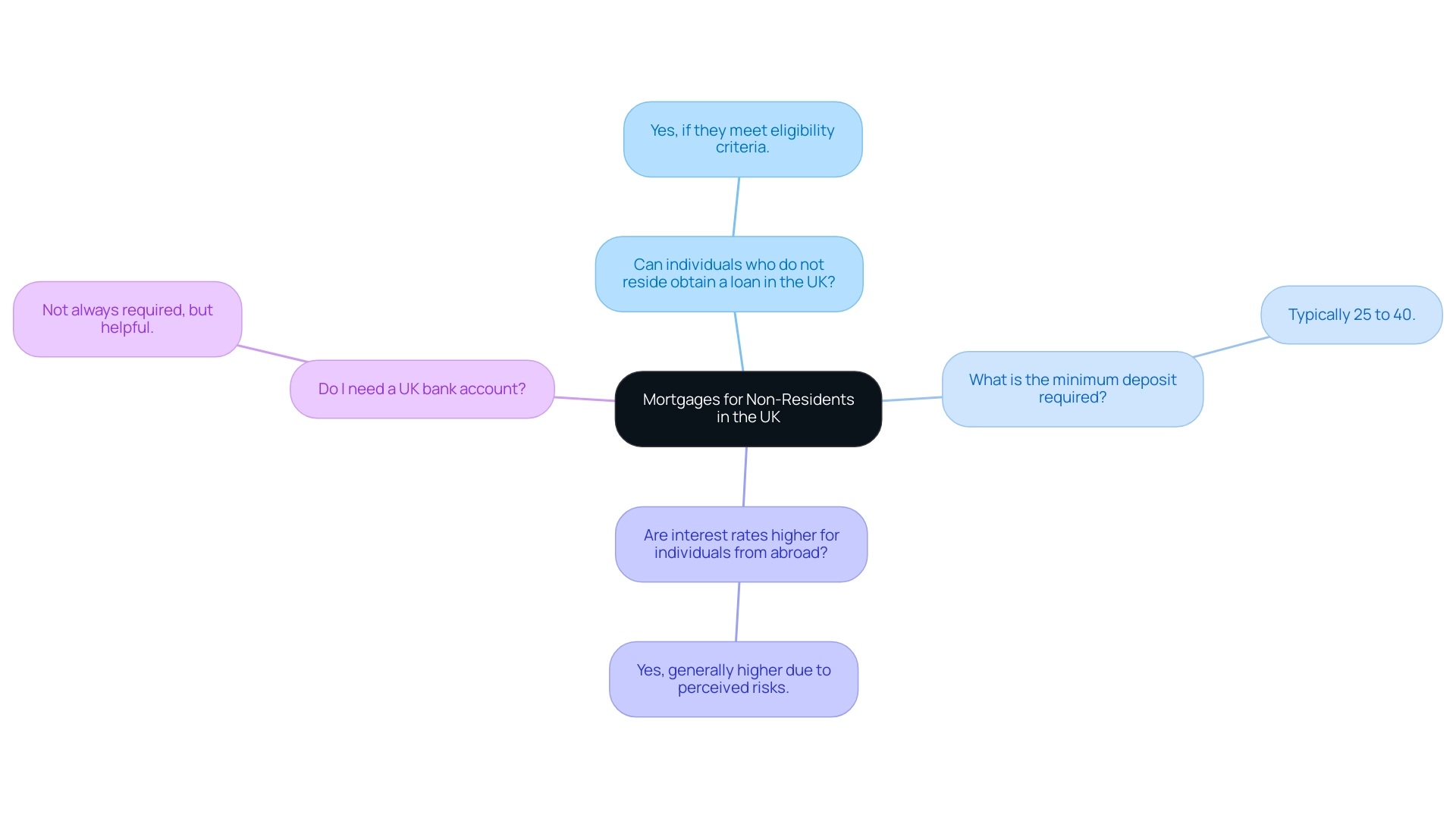
Conclusion
Navigating the UK mortgage market as a non-resident presents unique challenges and opportunities. This article has explored essential eligibility requirements, various types of mortgages available, and common obstacles faced by expatriates and foreign investors. Understanding these factors is crucial for non-residents seeking to invest in UK property, as it equips them with the knowledge needed to make informed decisions.
The mortgage landscape for non-residents is evolving, with increasing interest in buy-to-let and residential properties. While higher deposit requirements and interest rates remain prevalent, numerous lenders are willing to cater to this demographic, offering tailored solutions to meet their specific needs. Furthermore, as the market continues to change, staying updated on trends and expert insights can greatly enhance the chances of securing favorable mortgage terms.
Ultimately, potential buyers must approach the mortgage process with preparation and awareness of the financial implications. By leveraging expert advice and being proactive in addressing challenges, non-residents can successfully navigate the complexities of obtaining a mortgage in the UK. As interest in the UK property market grows, so too does the potential for non-residents to achieve their investment goals. It is essential to remain informed and strategic in their approach.




